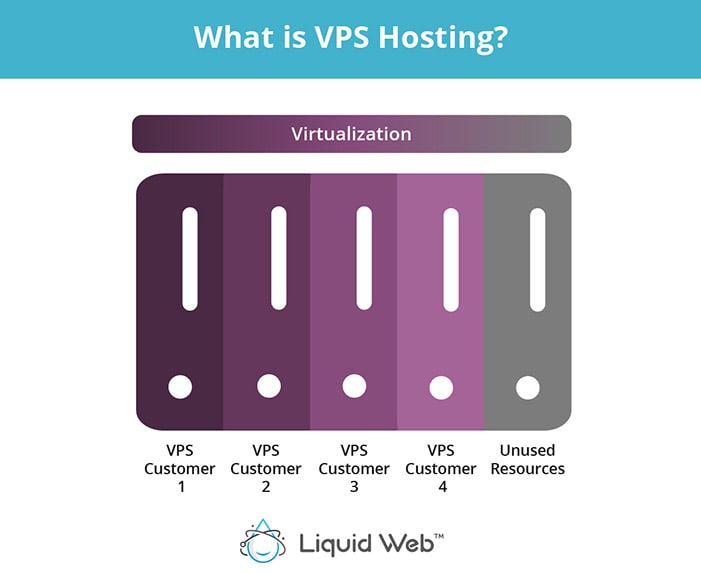
Do you need to know the top benefits or advantages of VPS hosting? Still searching to figure out the best hosting for your needs?
Do a quick Google search for web hosting and what you will most likely see is a long list of low-cost shared hosting options. Most people will click one of those results simply because they don’t know there are better options for their business. Unfortunately, this ends up in frustration and disappointment for the business owner when their site gets hacked, operates poorly, or when their site goes offline.
Most experienced developers agree that active businesses should not be using shared hosting. This type of hosting is best suited for personal sites, informational sites, and small non-profit organizations.
Most businesses can benefit greatly from using VPS hosting.
What is VPS Hosting?
Virtual Private Server Hosting (VPS Hosting) is a virtualized hosting solution with specific memory, space, and CPU cores allocated to a single tenant and is located on a single parent server or cluster of parent servers. Shared hosting, on the other hand, shares resources with hundreds, maybe even thousands of customers’ websites.

Businesses hosting on VPS gain benefits such as near-instant scalability and flexibility. VPS is one of the most affordable web solutions available on the market today, which can be a competitive advantage for your next web project.
10 Benefits of VPS Hosting
1. Avoid Noisy Neighbor Syndrome
As you compare shared vs VPS vs dedicated hosting, shared hosting is akin to living in an apartment building. If you share a wall with a neighbor that blasts his music at 3 am, it will disrupt your sleep. To translate this metaphor, if another customer suddenly starts using too many resources, your site on the same shared server can slow down or even go offline altogether.
VPS hosting is similar to living in a house in the city. You don’t share walls with anyone else, but your neighbor is still close enough to keep you awake if they turn that music all the way up. You will pay a little more for the solitude. With a VPS, there are other users on the physical server, but they are blocked out into a more private and protected block of the hard drive. VPS providers such as Liquid Web will stop any server resource issues long before they affect your business.
Dedicated hosting is a more expensive option than VPS and is similar to living in a house with a few acres of land. With a dedicated server, you are the only client on the physical server and have complete ownership of all server resources.
2. Dedicated Resources
Another one of the many benefits of VPS hosting is that all of your server resources are dedicated entirely to your business. In most cases, a VPS gives you more resources than shared hosting as well. You will not share CPU, RAM, space, or bandwidth with any other customer.
3. Speed
With shared hosting, your site’s performance will depend on the amount of resources being used by other sites on the server at any given time. Shared hosts have to try and configure the server to function with a wide range of website configurations.
A VPS can be optimized to run efficiently for your site. Due to more specialized configurations, an organization using managed VPS will notice hosting benefits such as better performance right out of the box.
4. Affordability and Value
While a VPS will usually cost more than shared hosting, it will not cost anywhere near as much as dedicated hosting. At Liquid Web, a high-performance VPS does not cost much more than most shared hosting plans. When you look at the advantages of VPS over shared hosting, you can quickly see why a VPS is a much better value, especially as you consider managed VPS hosting.
5. Access and Control
Sites owners using shared hosting have limited control over what is installed on their environment.
Businesses that lease VPS hosting will benefit from running only the services needed. For example, if you know you are not going to use email functionality on your server, you can shut down or even uninstall services like Bind or webmail applications. Liquid Web provides root access to your VPS so that you can make any changes you need.
6. Elasticity
If your site suddenly experiences a surge in traffic, as is usual during Black Friday promotions, you need to be able to scale your server resources to meet increasing traffic demands. This kind of fluctuation will often bring a shared server to a screeching halt, especially if other sites on the server experience the same thing. Not only is a VPS typically capable of absorbing these spikes, if your site does suddenly need more resources, VPS hosts can upgrade your resources quickly and easily.
7. Enhanced Security
Let’s face it, shared hosting is the least secure hosting option. This is not because shared hosts do not take security seriously. Most shared hosts work hard to patch systems and provide a secure environment. However, security on shared hosting is compromised due to the large numbers of customers accessing the server via Plesk, cPanel, or InterWorx. If one customer uses weak passwords and is hacked, this can put the entire server at risk.
A VPS, on the other hand, has none of these disadvantages. For one thing, fewer admin (root) users on a server (i.e., fewer customers) means fewer people have access that can be compromised. Also, VPS hosting users gain benefits from using virtualization technology to isolate data from other users. Finally, tools such as web application firewalls (WAFs), spam filters, and other security configurations can be more strict on a VPS because it does not have to work with as many different configurations as a shared server does.
8. Flexibility
A VPS has many use cases, such as gaming, email, or project management servers. If you use WordPress multisite, you will find that large multisite networks will demand higher resources and thus crash a shared server.
9. OS and Software Freedom
Many shared hosts will not allow you to run certain software applications. Most do not allow streaming software or gaming servers, for example.
With a VPS, you can usually pick your favorite operating system. You can choose from the best OS options like Ubuntu, Cloudlinux, or Debian. The same goes for server software.
10. Long-Term Scalability
As your business grows over time, you will inevitably need more resources for your website. With a VPS from Liquid Web, you can quickly and easily upgrade to a larger VPS or even an entire bare metal server.
Get An Industry-Leading VPS From Liquid Web Today
If you are running a website with very low traffic and no need for advanced functionality, shared hosting can suffice. However, for most other businesses, a VPS is almost always a better option with more performance, flexibility, and elasticity for years to come.
[ad_2]
Source link


![Top 10 Benefits of VPS Hosting [With Explanations]](https://dealzclick.com/wp-content/uploads/2022/01/CES-2022-Acer-Launches-New-Swift-X-Laptop-With-Intel.jpg)
![Top 10 Benefits of VPS Hosting [With Explanations]](https://dealzclick.com/wp-content/uploads/2022/01/1643512188_301-Moved-Permanently.jpg)



